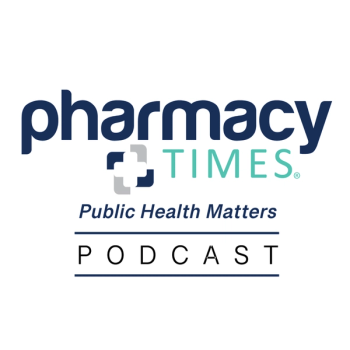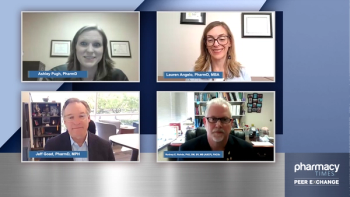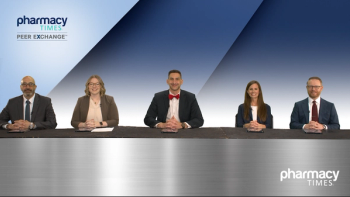
Tune into this episode of “Public Health Matters” to hear Dr. Bolu Oladini’s unconventional journey within pharmacy, his passion for mental health, and how artificial intelligence is beginning to be integrated into health care and everyday life.

Tune into this episode of “Public Health Matters” to hear Dr. Bolu Oladini’s unconventional journey within pharmacy, his passion for mental health, and how artificial intelligence is beginning to be integrated into health care and everyday life.

The panel concludes by sharing their insights and expressing their aspirations for future developments and improvements in RSV vaccination efforts.

The key opinion leaders examine the current prevalence of RSV infections and its evolution over time, analyzing the seasonal patterns of RSV outbreaks in the United States and identifying the demographic groups most vulnerable to RSV infections.

Key opinion leaders (KOLs) discuss the use of CDK4/6 inhibitors in early breast cancer, specifically in patients who have undergone chemotherapy and surgery. They highlight the key factors that help determine which patients are most likely to benefit from receiving these medications.

The panelists discuss the clinical and economic factors that influence treatment decisions for early breast cancer (eBC), as well as the differences between eBC and metastatic breast cancer (mBC) in terms of adverse event management protocols and strategies for optimizing patient adherence.

Pharmacy technicians can expand their skills to explores career growth.

Expert discusses the challenges faced by pharmacists in palliative and hospice care.

Guidance for pharmacy technicians as they continue to learn and start their careers.

Expert discusses the challenges faced by pharmacists in palliative and hospice care.

Emily Griffin discusses her career in pharmacy and in digital content creation.

Nicolas Girard, MD, PhD, discusses the results of the PALOMA-2 trial, highlighting the subcutaneous (SC) delivery of amivantamab combined with lazertinib as a first-line treatment for advanced non-small cell lung cancer (NSCLC) with EGFR mutations.

Pharmacists play a crucial role in managing pain for cancer patients in palliative care.

Heather Moore, BCOP, CPP, PharmD, discusses the importance of treatment for early breast cancer, highlighting the use of chemotherapy followed by endocrine therapy. She notes that CDK4/6 inhibitors are being added for higher-risk patients, and oral selective estrogen receptor degraders may also be used in advanced cases.

Frank Scimeca, PharmD, MBA, BCOP, discusses the crucial collaborative effort between academic and community practices in managing and monitoring patients receiving CDK4/6 inhibitors, emphasizing the importance of communication and coordination to ensure optimal patient care.

Medical professionals discuss the ongoing requirements in RSV treatment and vaccination, stressing the importance of at-risk populations maintaining hand hygiene, staying home when sick, and avoiding large crowds during peak seasons to minimize transmission, while also exploring the use of combination tests, panel testing, and rapid testing for RSV diagnosis.

Rodney E. Rohde, PhD, SM, SV, MB (ASCP), FACSc, guides a conversation on patient education materials, recommending resources from the American Pharmacists Association, the Centers for Disease Control and Prevention, and the Advisory Committee on Immunization Practices, which provide tools to inform the public about vaccine-preventable diseases.

Data from the PERSEUS trial supports use of daratumumab in combination with bortezomib, lenalidomide, and dexamethasone followed by daratumumab and lenalidomide maintenance as a new standard of care for patients with newly diagnosed multiple myeloma.

Results from the initial safety run-in of MajesTEC-7 indicate that the combination of teclistamab, daratumumab, and lenalidomide in newly diagnosed multiple myeloma (NDMM) shows a manageable safety profile with early signs of efficacy.

The PALOMA-3 trial showed subcutaneous amivantamab was better than IV for lung cancer patients.

Understanding patients’ specific experiences and challenges is crucial to helping them improve medication adherence.

In addition to medication management, pharmacists are educating patients and helping them navigate the complex medical system.

Tune into this special episode of “Public Health Matters” to hear Emma White, the founder and president of the nonprofit organization Life Is Worth It, discuss her mental health journey and how she used it to educate adolescents, teenagers, and young adults on mental wellness.

Lenora Newsome, PD, president of the National Association of Boards of Pharmacy, explores how pharmacists can support mental health through private conversations, and educating about prescriptions.

Sarah Rockwell, PharmD, BCOP, and Ke Ning, MD, share their concluding remarks, reflecting on the current landscape and expressing their aspirations for addressing remaining unmet needs.

Ke Ning, MD, describes similarities and differences when implementing bispecific antibodies and CAR T-cell therapy for patients with relapsed or remitting multiple myeloma in the community oncology setting.

Medical professionals highlight the essential support provided by pharmacists in addressing operational challenges related to bispecific antibodies. Pharmacists can play an important role in the development of policies and procedures, monitoring and management of toxicities, and delivery of educational resources.

Penelope Murphy discusses the role that preceptors play in mentoring students and new pharmacists to help bridge the gap between classroom learning and real-world practice.

In their concluding remarks, Arun Jesudian, MD; Ralph J. Riello, PharmD, BCPS, and Chas McCormick, RPh, MBA, summarize the key takeaways and highlight the persistent unmet needs in the management of hepatic encephalopathy.

The panel concludes its discussion with insights on successful strategies that can inform optimal collaborative care practices for cardiovascular risk reduction in patients with ASCVD.

Heather Moore, BCOP, CPP, PharmD, discusses switching from CDK4/6 inhibitors to later lines of therapy, typically due to toxicities, to alleviate symptoms. She emphasizes the goal of finding a new therapy rather than abandoning treatment altogether, and notes that targeted therapy may be necessary in cases of disease progression.